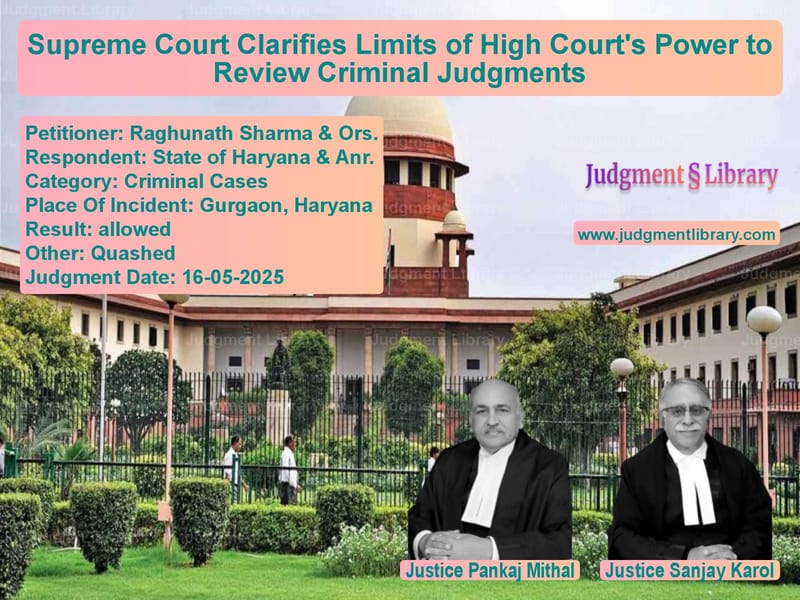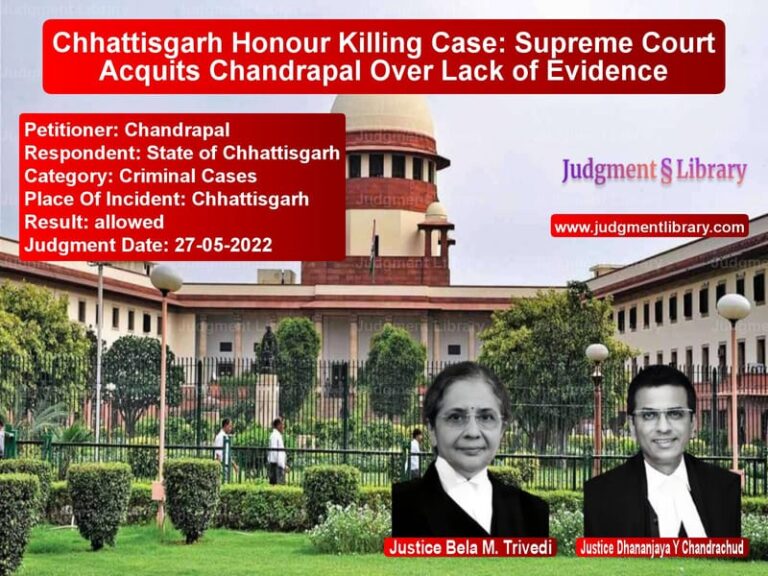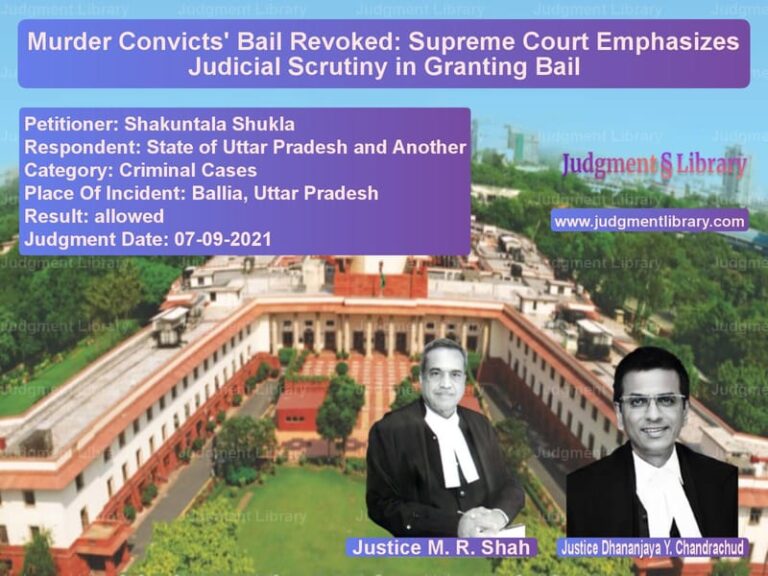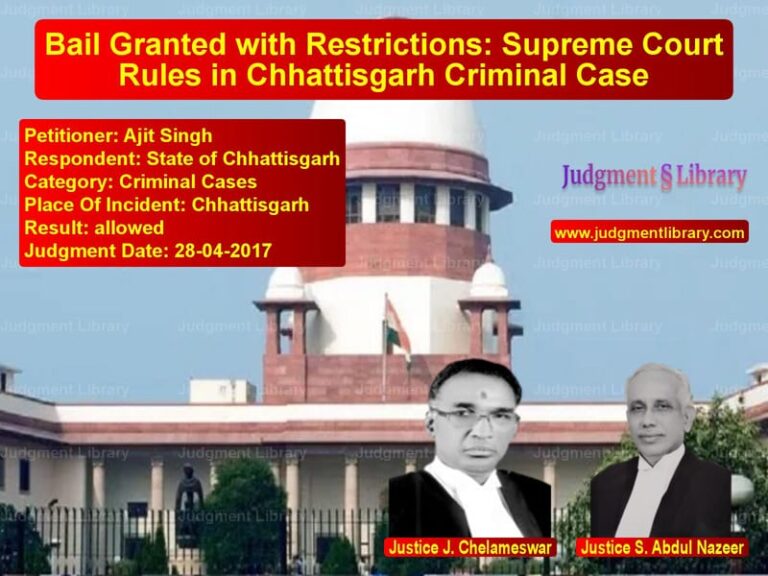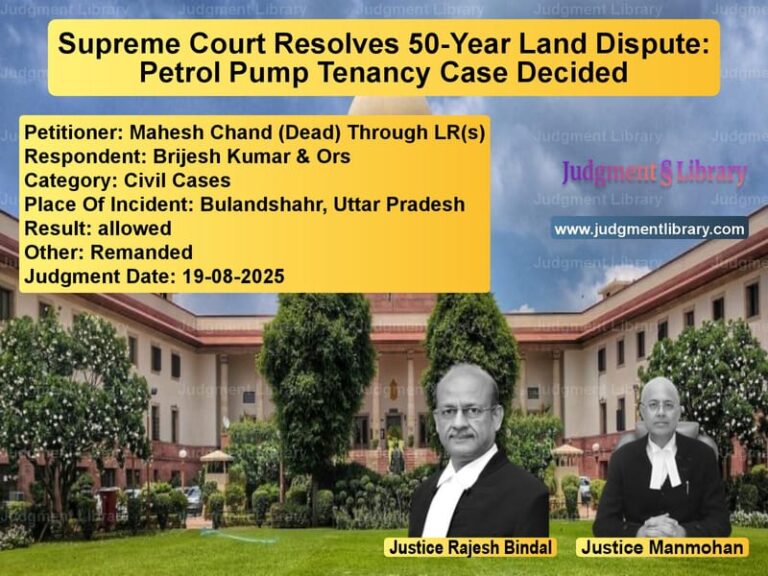Supreme Court Clarifies Limits of High Court’s Power to Review Criminal Judgments
In a significant ruling that reinforces the finality of criminal judgments, the Supreme Court of India has delivered a landmark judgment clarifying the limitations on High Courts’ power to review or alter their own decisions in criminal matters. The case involving Raghunath Sharma and others versus the State of Haryana addresses a fundamental question about when courts can revisit their own judgments after they have been formally delivered.
The dispute originated from a series of property transactions between the parties, beginning with an agreement to sell dated May 21, 2013, followed by subsequent agreements and memoranda of understanding. When disputes arose concerning these agreements, the parties eventually entered into a fresh agreement to sell dated April 15, 2015, which superseded all previous arrangements. The sale consideration was fixed at Rs. 2.25 crores, with various payment mechanisms agreed upon.
Most importantly, the parties executed a compromise deed on July 14, 2015, with the intention of bringing all ongoing litigations to an end. Based on this compromise, the High Court of Punjab and Haryana at Chandigarh quashed FIR No. 432 of 2014 dated July 15, 2014, which had been registered under Sections 406 (criminal breach of trust) and 420 (cheating) of the Indian Penal Code at Police Station Sector 10, Gurgaon. The quashing order dated March 21, 2016, noted that the parties had arrived at a compromise without any pressure or coercion and that the matter involved personal disputes that had been amicably resolved.
However, the spirit of compromise was short-lived. Soon after the quashing order, the complainant, Krishan Kumar Gandhi, filed an application on September 10, 2016, seeking revival of the FIR. When this application was rejected on September 24, 2016, he filed another similar application on March 27, 2018. Surprisingly, the High Court allowed this application through its impugned judgment dated October 8, 2018, and restored the previously quashed FIR, directing the authorities to restart the investigation. The High Court also dismissed a review petition against this restoration order on April 29, 2019.
Aggrieved by this turn of events, the appellants approached the Supreme Court, challenging the High Court’s authority to recall its own judgment quashing the criminal proceedings. The central legal question before the Supreme Court was whether the High Court could validly exercise its powers under Section 482 of the Code of Criminal Procedure, 1973, to restore a First Information Report that it had previously quashed based on a compromise between the parties.
The Legal Framework
The Supreme Court began its analysis by examining the scope and ambit of Section 482 of the Cr.P.C., which preserves the inherent powers of High Courts. The Court referred to several landmark decisions, including State of Karnataka v. L. Muniswamy, Sunder Babu v. State of Tamil Nadu, Vineet Kumar v. State of U.P., and Ahmad Ali Quraishi v. State of Uttar Pradesh.
The Court particularly emphasized the principles laid down in State of Karnataka v. M. Devendrappa, where a three-judge bench had aptly encapsulated the purpose of this power: “Exercise of power under Section 482 of the Code in a case of this nature is the exception and not the rule. The section does not confer any new powers on the High Court. It only saves the inherent power which the Court possessed before the enactment of the Code. It envisages three circumstances under which the inherent jurisdiction may be exercised, namely, (i) to give effect to an order under the Code, (ii) to prevent abuse of the process of court, and (iii) to otherwise secure the ends of justice.”
The Court further noted that “inherent jurisdiction under the section though wide has to be exercised sparingly, carefully and with caution and only when such exercise is justified by the tests specifically laid down in the section itself.”
The Bar Under Section 362 Cr.P.C.
The Supreme Court then turned to Section 362 of the Cr.P.C., which deals with the finality of judgments. This section provides that once a court has signed its judgment or final order disposing of a case, it cannot alter or review the same, except to correct a clerical or arithmetical error.
The Court extensively discussed the interpretation of this provision through various precedents. In Sanjeev Kapoor v. Chandana Kapoor, the Court had observed: “The legislative scheme as delineated by Section 369 of the Code of Criminal Procedure, 1898, as well as legislative scheme as delineated by Section 362 of the Code of Criminal Procedure, 1973 is one and the same. The embargo put on the criminal court to alter or review its judgment is with a purpose and object. The judgments of this Court as noted above, summarised the law to the effect that criminal justice delivery system does not clothe criminal court with power to alter or review the judgment or final order disposing of the case except to correct the clerical or arithmetical error. After the judgment delivered by a criminal court or passing of the final order disposing of the case the court becomes functus officio and any mistake or glaring omission is left to be corrected only by appropriate forum in accordance with law.”
Similarly, in Hari Singh Mann v. Harbhajan Singh Bajwa, the Court had held: “Section 362 of the Code mandates that no court, when it has signed its judgment or final order disposing of a case shall alter or review the same except to correct a clerical or an arithmetical error. The section is based on an acknowledged principle of law that once a matter is finally disposed of by a court, the said court in the absence of a specific statutory provision becomes functus officio and disentitled to entertain a fresh prayer for the same relief unless the former order of final disposal is set aside by a court of competent jurisdiction in a manner prescribed by law. The court becomes functus officio the moment the official order disposing of a case is signed. Such an order cannot be altered except to the extent of correcting a clerical or an arithmetical error.”
The Conflict Between Section 362 and Section 482
The crucial question before the Court was whether the saving clause “Save as otherwise provided by this Code” in Section 362 permits alterations under Section 482 Cr.P.C.
The Court found clear answers in its previous decisions. In Sankatha Singh v. State of U.P., the Court had observed that “the appellate court is not to alter or review the judgment once signed, except for the purpose of correcting a clerical error.”
More significantly, in Sooraj Devi v. Pyare Lal, the Court had categorically held: “The appellant points out that he invoked the inherent power of the High Court saved by Section 482 of the Code and that notwithstanding the prohibition imposed by Section 362 the High Court had power to grant relief. Now it is well settled that the inherent power of the court cannot be exercised for doing that which is specifically prohibited by the Code. It is true that the prohibition in Section 362 against the court altering or reviewing its judgment is subject to what is ‘otherwise provided by this Court or by any other law for the time being in force’. Those words, however, refer to those provisions only where the court has been expressly authorised by the Code or other law to alter or review its judgment. The inherent power of the court is not contemplated by the saving provision contained in Section 362 and, therefore, the attempt to invoke that power can be of no avail.”
The Court noted that this position had been consistently followed in Simrikhia v. Dolley Mukherjee, State of Punjab v. Davinder Pal Singh Bhullar, Gian Singh v. State of Punjab, and Telangana Housing Board v. Azamunnisa Begum.
The Limited Exceptions
The Supreme Court acknowledged that there are limited exceptions to this general rule. In Davinder Pal Singh Bhullar, the Court had recognized that “If a judgment has been pronounced without jurisdiction or in violation of principles of natural justice or where the order has been pronounced without giving an opportunity of being heard to a party affected by it or where an order was obtained by abuse of the process of court which would really amount to its being without jurisdiction, inherent powers can be exercised to recall such order for the reason that in such an eventuality the order becomes a nullity and the provisions of Section 362 CrPC would not operate.”
The Court specifically identified two exceptions: (a) violation of the audi alteram partem rule (the right to be heard) of natural justice, and (b) abuse of process of law which would affect the jurisdiction of the Court to deal with the matter. These exceptions were subsequently approved by a three-judge bench in New India Assurance Co. Ltd. v. Krishna Kumar Pandey.
However, the Court emphasized that these exceptional circumstances were not present in the current case.
Application to the Present Case
Applying these legal principles to the facts of the case, the Supreme Court found that the High Court had clearly exceeded its jurisdiction. The Court observed that “the role of the Court, after a judgment has been delivered, is circumscribed by the law itself. In the present facts, the only provision of law, that permits an alteration in the judgment, in its own terms, was not resorted to. What was done was a review of the judgment quashing the proceedings. That, in the considered view of this Court, was not permissible.”
The Court reinforced this position by referring to State of M.P. v. Man Singh, which had stated: “It is well settled law that the High Court has no jurisdiction to review its order either under Section 362 or under Section 482 CrPC. The inherent power under Section 482 CrPC cannot be used by the High Court to reopen or alter an order disposing of a petition decided on merits. After disposing of a case on merits, the Court becomes functus officio and Section 362 CrPC expressly bars review and specifically provides that no court after it has signed its judgment shall alter or review the same except to correct a clerical or arithmetical error. Recall of judgment would amount to alteration or review of judgment which is not permissible under Section 362 CrPC. It cannot be validated by the High Court invoking its inherent powers.”
Similarly, in Narayan Prasad v. State of Bihar, the Court had reiterated that once a judgment has been passed, the powers under Section 482 Cr.P.C. do not permit its alteration or review. Such power is meant solely to secure the ends of justice and it cannot be taken to mean doing something that is expressly prohibited by statute.
The Supreme Court’s Decision
Based on this comprehensive analysis of the law, the Supreme Court concluded that “the impugned judgment was passed by the High Court without any authority or basis. Once the criminal cases had been quashed, under Section 482 Cr.P.C. on the ground of compromise entered into between the parties, one of the parties violating terms thereof is a ground entirely foreign to law, to once again invoke such powers and recall the order of quashing.”
The Court emphasized that violations of the terms of a compromise have their own avenues of law through which they can be enforced, but recalling a quashing order is not one of them.
Accordingly, the Supreme Court allowed the appeals and set aside the impugned judgment and orders of the High Court. The restoration of the FIR and all consequences flowing from such revival were quashed.
Guidelines for Future Cases
The Supreme Court took the opportunity to provide clear guidelines for future cases, summarizing its findings as follows:
“1. The bar under Section 362 Cr.P.C. is almost absolute;
2. The only exceptions to the bar, which would then permit the invocation of inherent powers, would be if it is necessary to meet the ends of justice; or to remedy the abuse of the process of law. Other than the above two circumstances, such inherent powers do not permit the doing of what stands prohibited by the text of the statute;
3. To clarify, it may be stated that when a Court finds itself in such extraordinary circumstances, the reasons for exercising such power should be recorded, justifying the invocation thereof.”
The Court expressed surprise that the High Court had adopted the course it did without reference to the well-established position of law. To prevent similar errors in the future, the Court directed the Registry to circulate a copy of this judgment to all High Courts for necessary dissemination to all concerned.
This landmark judgment reinforces the principle of finality in criminal proceedings and provides much-needed clarity on the limitations of High Courts’ powers to review their own judgments. By strictly interpreting Section 362 of the Cr.P.C. and delineating the narrow exceptions to this rule, the Supreme Court has ensured that the criminal justice system maintains both certainty and integrity while still allowing for corrective measures in genuinely exceptional circumstances.
Petitioner Name: Raghunath Sharma & Ors..Respondent Name: State of Haryana & Anr..Judgment By: Justice Pankaj Mithal, Justice Sanjay Karol.Place Of Incident: Gurgaon, Haryana.Judgment Date: 16-05-2025.Result: allowed.
Don’t miss out on the full details! Download the complete judgment in PDF format below and gain valuable insights instantly!
Download Judgment: raghunath-sharma-&-o-vs-state-of-haryana-&-a-supreme-court-of-india-judgment-dated-16-05-2025.pdf
Directly Download Judgment: Directly download this Judgment
See all petitions in Judicial Review
See all petitions in Judgment by Pankaj Mithal
See all petitions in Judgment by Sanjay Karol
See all petitions in allowed
See all petitions in Quashed
See all petitions in supreme court of India judgments May 2025
See all petitions in 2025 judgments
See all posts in Criminal Cases Category
See all allowed petitions in Criminal Cases Category
See all Dismissed petitions in Criminal Cases Category
See all partially allowed petitions in Criminal Cases Category

